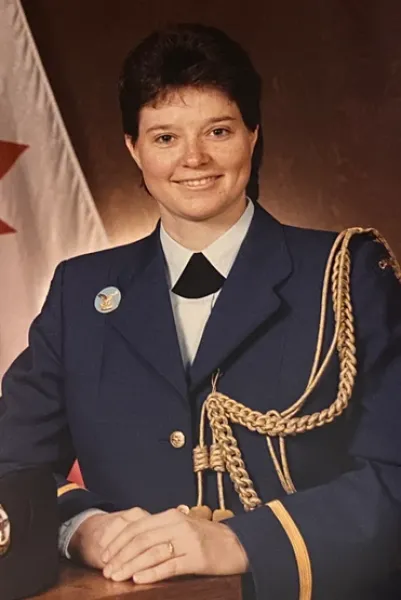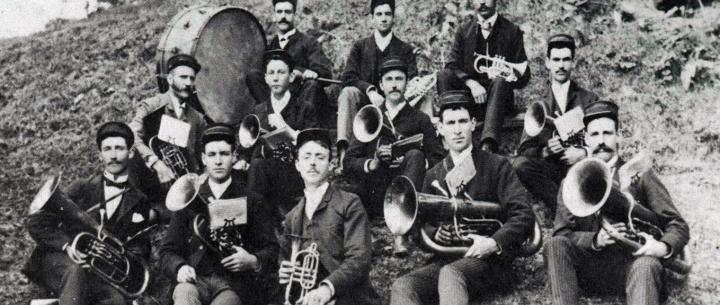From the Two-Spirit Pow-Wows in Downsview Park, to the queer-positive roller derbies in the Downsview Supply Depot, to inclusion at Downsview United Church, today, 2SLGBTQI+ people are at home on the Downsview lands.
But the area’s queer history also includes a darker chapter, related to Canada’s LGBT Purge.
Beginning in the 1950s, LGBT members of the Canadian Armed Forces, the Royal Canadian Mounted Police (RCMP), and the federal public service were targeted for systematic removal from these organizations. Using stalking, spying, harassment, and harsh interrogation tactics, an estimated 9,000 lives were negatively impacted in this practice — one that would continue for more than forty years. Today, it is known as the LGBT Purge.
Michelle Douglas & Making Queer History in Downsview
One life profoundly impacted by the LGBT Purge was that of Michelle Douglas. Ms. Douglas was an Air Force Lieutenant and later one of the first women to join the military’s Special Investigations Unit at Downsview at the age of 23. She was based in Downsview when she was “purged” in 1989.

Whisked away from the base without warning, Ms. Douglas was interrogated at the nearby Constellation Hotel for three days. There, she was accused of, and eventually admitted to, being a lesbian.
She remained on base for a year doing administrative work, during which time she suffered abuse and bullying from co-workers. She was wounded but undeterred.
When Ms. Douglas wasn’t allowed to fight for her country, she took up a new fight — a very personal one. Her courage and determination led her to sue the Canadian Government for her dismissal and for infringing on her charter rights. She stood up to bigotry and inequality. And she won.
In October 1992, the Government abandoned its policy of sanctioned homophobia and ended its discriminatory policy against 2SLGBTQI+people in the military.

Last fall, Ms. Douglas celebrated the 30th anniversary of her victory. So did thousands of others who, thanks to her, could pursue a career in the military without hiding who they loved. It was a historic fight, and a historic win, and one that started on the Downsview lands.
In the summer of 2025, a national monument to the LGBT Purge and wider discrimination against 2SLGBTQI+ people in Canada will be opened in Ottawa, funded by the class action settlement launched by LGBT Purge survivors and reached in 2018. The historic settlement included between $15 and $25 million for memorializing this time in community history, while up to $110 million was set aside for the payment of damages of the survivors of the LGBT Purge. You can learn more about the monument here.
Hebert Sutcliffe & Teaching History in Downsview
While the LGBT Purge kicked one soldier out of Downsview, it brought in another.
Toronto-born Herbert Sutcliffe was a decorated WWII veteran, awarded the Member of Order of the British Empire for his heroics in Calais, France in 1944. He quickly rose through the ranks, until June 1962, when — on the eve of being sent to a new post at the Pentagon — he was discharged for being gay.

His dismissal was devastating, and Mr. Sutcliffe even contemplated suicide. His military career was shattered, but soon another would take its place. Always a history buff, Mr. Sutcliffe enrolled in teacher’s college and soon secured a job teaching English and History at Downsview High School.
It seems the military’s loss was Downsview’s great gain; Mr. Sutcliffe had an exceptionally positive impact on his students. An online call for memories from his former students only drew praise.
His former students told us they never skipped his history classes. He was an “amazing man, amazing teacher, and a very kind and caring soul” — someone who “dressed impeccably, spoke respectfully,” and was an “interesting, understanding, and positive role model for others.”
Mr. Sutcliffe died on August 17, 2003, after having been “out” for decades. He said, "I reached the point where I wouldn't apologize for being gay. That's the way I am, and I'm comfortable with it."
You can learn more about Mr. Sutcliffe’s remarkable life in an article in Defining Moments Canada, available here.
Like Canada’s wider military history, Downsview’s military history is complex and nuanced. Shining lights in dark corners is one way forward. Those like Michelle Douglas continue to work towards full inclusion for queer people in the federal service, and activists and allies — in Downsview and beyond — are drawing learnings and inspiration from the past for a more inclusive future.
More Stories

Downsview’s First Synagogue: Beth Am
You may recognize that line from the 1989 hit movie Field of Dreams. The central character, played by Kevin Costner, hears a voice instructing him to build a baseball field in the middle of an Iowa cornfield. If he did, the disgraced ballplayer Shoeless Joe Jackson, would magically appear. And he did.

The Downsview Brass Band
In the 1950s, future stars from the worlds of rock and roll, rockabilly, and R&B like Roy Orbison and Ike and Tina Turner, played the Crang Plaza Auditorium at Jane and Wilson.
